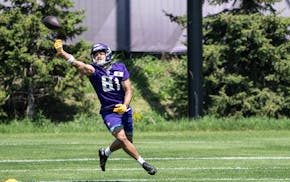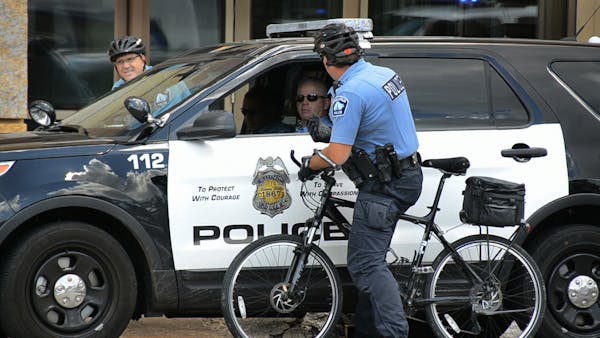Editor's note: This is the fourth in a series of stories leading up to the All-Star Game at Target Field.
--
When the All-Star Game last came to Minnesota in 1985, three American League players — Dave Winfield, Paul Molitor and Jack Morris — made sure they got a portrait together for posterity.
"It's still one of my favorite pictures," Morris said.
They were, years earlier, three kids from St. Paul, their youthful competitions overlapping. The 1985 All-Star Game found them together as American League teammates for the first time in their big-league careers. A fourth kid from St. Paul, Joe Mauer, has played in six All-Star Games and won three AL batting titles.
"To see this much talent from here and develop, baseball-wise, like they have, that's amazing," Twins manager Ron Gardenhire said. "Being from the north, you don't have the advantage of kids in the south with the weather, playing year-round and everything. You have to make your own advantages. And you have to be really good."
Indeed, to have that much talent come from a single city — a midsized northern city, no less — defies all expectations. St. Paul is the only city to have two members of the 3,000-hit club in Winfield and Molitor, who grew up within five blocks of one another in the Midway area of St. Paul and are both in the Hall of Fame. Morris was one of the best pitchers of his era and could still be elected to the Hall of Fame by the Veteran's Committee. Mauer, now the Twins' first baseman, is the only catcher with more than one batting title.
It's not a stretch to say that one day all four could be in the Hall of Fame.
"It's a source of pride," St. Paul Mayor Chris Coleman said. "Think about it: Three All-Stars at one time, and they all grew up near one another. I don't know that there's another community in the country that can say that."
Not to rub it in, but name the best player to come out of Minneapolis, a much larger city than its Twin Cities counterpart. Stumped? You should be.
It might be Johnny Blanchard, a part of two World Series winners with the Yankees in the early 1960s. But Blanchard, who attended Minneapolis Central High School, never made an All-Star team and retired in 1965 with a .239 career average.
St. Paul's list of major league players only starts with Winfield, Molitor, Morris and Mauer. Tom Johnson (Murray High School) went 16-7 with 15 saves for the Twins in 1977 before arm problems ended his career. Jerry Kindall (Washington High School) played nine big-league seasons. Jack Hannahan, like Molitor and Mauer a product of Cretin-Derham Hall, has played seven major league seasons. St. Paul also boasts hockey legend Herb Brooks and a Heisman Trophy winner, Chris Weinke.
More than coincidence
Hennepin County Commissioner Mike Opat, a longtime coach of youth sports who was instrumental in getting Target Field built, said he's spent a good deal of time pondering why St. Paul has produced so many baseball players compared to Minneapolis. He believes it comes down to a philosophical difference between the parks departments of the two cities.
"The Minneapolis Park Board is not focused on athletics," Opat said. "They're focused on parks and trails and general recreation, but they're not focused on competitive athletics. … The youth programs are just not as strong in Minneapolis. They haven't been, dating back forever."
Former Twins President Jerry Bell, once the North St. Paul parks and rec director, agrees.
"St. Paul has always been a sandlot kind of town, for kids and adults," Bell said. "It's always been more of a baseball town than Minneapolis, maybe not so much now, but years ago it certainly was."
Molitor and Mauer, who grew up in the Lexington Parkway area of St. Paul, both talked of how St. Paul youngsters were often identified by the park or ballpark they were affiliated with, places such as Oxford, Highland or Dunning. Later that identification switched to Legion teams such as Attucks Brooks or Christie de Parcq.
St. Paul Mayor Coleman said the city's success in producing athletes traces to "the playgrounds, it goes back to people like Billy Peterson,'' a legendary Legion coach for Attucks Brooks who is still coaching teams in the city's RBI youth program.
"I attribute a lot of [St. Paul's success] to the coaching we had at the youth level," Morris said. "We had coaches who were fundamentally sound, and they pushed us. It wasn't 'everybody gets a trophy' back then. Winning was very important, and they pushed the hell out of us."
Morris credits one other factor for the development of youth talent from that era: the arrival of the Twins before the 1961 season.
"The Twins meant so much to us when we were kids," he said. "They had great teams in the mid-to-late '60s, and that's when we were kids. We had this dream of being one of them someday, and we had coaches who helped us get there."
The trailblazer
Peterson was a no-nonsense ex-Marine whose Attucks Brooks Legion teams put St. Paul on the national map and set the bar for the players who followed. Peterson's first great Legion teams were led by Winfield and his one-year-older brother, Steve.
"A lot of people pat me on the back and say, 'What a great coach,' " Peterson said. "I was learning right along with Dave and Steve. I had no idea how good David was — there was nothing to gauge it by. Back then, we had the mentality that if you were from Minnesota, you must not be very good on a national level."
That started to change, Peterson said, after Dave Winfield's sophomore year, when Attucks went to Omaha to compete in a regional tournament. That's when major league scouts first discovered Dave Winfield, who would ultimately be a first-round pick in baseball's amateur draft.
By the time Molitor was playing for Attucks Brooks a couple of years later, Peterson said he "could tell what I had, because I had [Winfield] to gauge it by."
Molitor and Morris were contemporaries, competing against one another throughout their amateur careers. Morris played Legion ball for Christie, and was frequently reminded that "if you want to be good, you've got to beat Attucks Brooks. There was always that competition among us."
Having Winfield, Molitor and Morris paving the way helped beget the next generation of St. Paul talent.
"Growing up, a lot of my friends had dreams of playing in the big leagues," Mauer said. "I know I did, and seeing guys from this area achieve that goal, it was like it made it possible. It's pretty neat to have those caliber of players right down from your street."
It's what makes that photo from the 1985 All-Star Game so special to each of the players in it.
"I don't know if we'll ever see something like that happen again, with three guys [from the same cold-weather city] on the same All-Star team," Molitor said.
"The NHL All-Star Game, maybe."
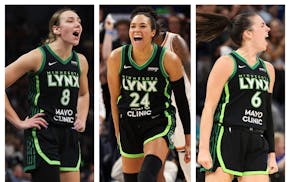
As Lynx 'run it back' this season, their bedrock is trio from the Class of '19
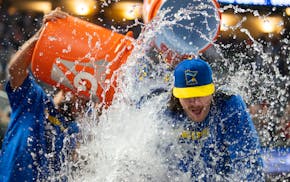
Paddack clings to perfection into the sixth inning, pitching the Twins past the Giants
Reusse: Twins play Giants, triggering Mays memories and a question: Can we get the Black players back?
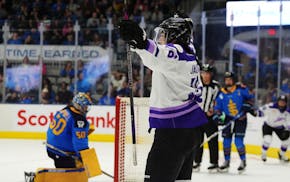
Frost turn away Toronto, even PWHL playoff series at a win apiece
